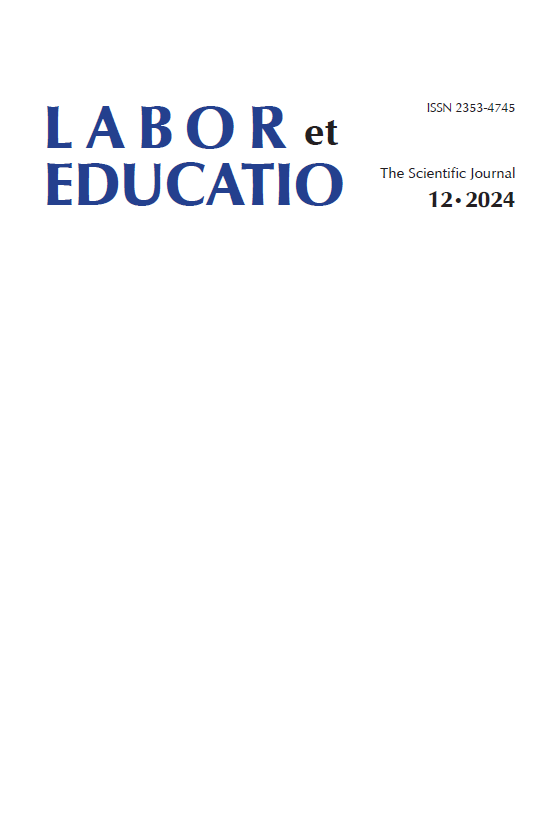Rozwijanie biegłości fonologicznej: rola edukacyjnych gier językowych w programach nauczania w przedszkolach hebrajskich
DOI:
https://doi.org/10.12775/LE.2024.006Słowa kluczowe
rozwój fonologiczny, edukacyjne gry językowe, hebrajskie przedszkole, przyswajanie języka, edukacja inkluzyjnaAbstrakt
Tło: Rozwój fonologiczny odgrywa kluczową rolę we wczesnym przyswajaniu języka, stanowiąc podstawę dla biegłości w czytaniu i pisaniu. Dla dzieci hebrajskojęzycznych
uczęszczających do przedszkola złożoność fonologicznego systemu języka hebrajskiego stwarza zarówno wyzwania, jak i możliwości. Niniejsze badanie analizuje teoretyczne podstawy rozwoju fonologicznego, czerpiąc z perspektyw kognitywnych, socjokulturowych, interakcjonistycznych i socjolingwistycznych, a także bada potencjał edukacyjnych gier językowych w przedszkolnych klasach hebrajskich.
Metody: W badaniu zastosowano jakościowy projekt badawczy, koncentrując się głównie na systematycznym przeglądzie literatury oraz analizie treści. Postawione pytania badawcze dotyczą tego, jakie wnioski można wyciągnąć z wcześniejszych badań akademickich na temat przyswajania języka, w szczególności rozwoju fonologicznego, oraz w jaki sposób odkrycia te mogą wspierać praktyczne zastosowanie edukacyjnych gier językowych w edukacji wczesnoszkolnej.
Wyniki: Badanie podkreśla znaczenie całościowej integracji wniosków teoretycznych z praktyką pedagogiczną, zwracając uwagę na dopasowanie do procesów poznawczych, interakcje socjokulturowe, uwzględnianie indywidualnych różnic oraz włączanie treści do programu nauczania. Wśród rekomendacji dla nauczycieli i decydentów znajdują się: dostosowanie nauczania do etapów rozwoju poznawczego, promowanie współpracy w nauce, uwzględnianie różnorodnych potrzeb uczniów, zapewnienie rozwoju zawodowego nauczycieli, alokacja zasobów, wdrażanie systemów oceniania oraz wspieranie polityki edukacyjnej sprzyjającej rozwojowi fonologicznemu.
Wnioski: Poprzez połączenie teorii z praktyką, badanie dostarcza cennych wskazówek dla nauczycieli i decydentów dążących do wspierania rozwoju fonologicznego dzieci hebrajskojęzycznych w przedszkolach. Harmonijne połączenie wniosków teoretycznych z praktycznymi rekomendacjami tworzy bogate w język środowisko edukacyjne, wspierając młodych uczniów w ich rozwoju językowym oraz promując inkluzywność w procesie edukacyjnym.
Bibliografia
Assaoui, H. (2016). Variability in Comprehension: A Look at the Proficiency Level and Working Memory Functions Among Nonnative Readers of Arabic.
Babakr, Z., Mohamedamin, P., & Kakamad, K. (2019). Piaget’s cognitive developmental theory: Critical review. Education Quarterly Reviews, 2(3).
Ben-David, A., & Bat-El, O. (2016). Paths and stages in acquisition of the phonological word in Hebrew. Acquisition and development of Hebrew: From infancy to adolescence, 39-68.
Benway, N. R., Garcia, K., Hitchcock, E., McAllister, T., Leece, M. C., Wang, Q., & Preston, J. L. (2021). Associations between speech perception, vocabulary, and phonological awareness skill in school-aged children with speech sound disorders. Journal of Speech, Language, and Hearing Research, 64(2), 452-463.
Eviatar, Z., Taha, H., Cohen, V., & Schwartz, M. (2018). Word learning by young sequential bilinguals: Fast mapping in Arabic and Hebrew. Applied Psycholinguistics, 39(3), 649-674.
Gendler-Shalev, H., Ben-David, A., & Novogrodsky, R. (2021). The effect of phonological complexity on the order in which words are acquired in early childhood. First Language, 41(6), 779-793.
Gruss, J. (2016). Games as a tool for teaching English vocabulary to young learners. World Scientific News, 53(2), 67-109.
Haim, M., & Bat-El Foux, O. (2022). Asynchronization at the phonology-morphology interface: A case study of an atypically developing Hebrew-acquiring boy. Clinical Linguistics & Phonetics, 1-26.
Hassinger‐Das, B., Ridge, K., Parker, A., Golinkoff, R. M., Hirsh‐Pasek, K., & Dickinson, D. K. (2016). Building vocabulary knowledge in preschoolers through shared book reading and gameplay. Mind, Brain, and Education, 10(2), 71-80.
Johnson, E. K., & White, K. S. (2020). Developmental sociolinguistics: Children's acquisition of language variation. Wiley Interdisciplinary Reviews: Cognitive Science, 11(1), e1515.
Keren-Portnoy, T., & Segal, O. (2016). Phonological development in Israeli-Hebrew-learning infants and toddlers. Acquisition and development of Hebrew, 69-94.
Kostikova, І. І. (2017). Language games in teaching English.
O'Kane, J. C., & Goldbart, J. (2016). Communication before speech: Development and assessment. David Fulton Publishers.
Pathan, H., Memon, R. A., Memon, S., Khoso, A. R., & Bux, I. (2018). A critical review of Vygotsky’s socio-cultural theory in second language acquisition. International Journal of English Linguistics, 8(4), 232.
Piaget, J., & Cook, M. (1952). The origins of intelligence in children (Vol. 8, No. 5, pp. 18-1952). New York: International Universities Press.
Rachmani, R. (2020). The effects of a phonological awareness and alphabet knowledge intervention on four-year-old children in an early childhood setting. Australasian Journal of Early Childhood, 45(3), 254-265.
Sukenik, N. (2023). Relative clause production abilities of Hebrew-speaking children with ASD. Language Acquisition, 1-22.
Vygotsky, L. S., & Cole, M. (1978). Mind in society: Development of higher psychological processes. Harvard university press.
Vygotsky, L. S. (2016). The collected works of LS Vygotsky: Problems of general psychology, including the volume thinking and speech. Springer.
Wasserstein, D., & Lipka, O. (2019). Predictive examination of phonological awareness among Hebrew-speaking kindergarten children. Frontiers in psychology, 10, 1809.
Pobrania
Opublikowane
Jak cytować
Numer
Dział
Licencja

Utwór dostępny jest na licencji Creative Commons Uznanie autorstwa 4.0 Międzynarodowe.
Creative Commons CC BY ND
Statystyki
Liczba wyświetleń i pobrań: 347
Liczba cytowań: 0
